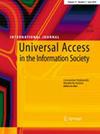Robots for inclusive classrooms: a scoping review
IF 2.7
4区 计算机科学
Q3 COMPUTER SCIENCE, CYBERNETICS
引用次数: 0
Abstract
Abstract Robot-based activities have been proven to be a valuable tool for children with learning and developmental disabilities. However, their feasibility in general educational environments needs further exploration. This scoping review provides a critical examination of robot-based learning experiences involving children with disabilities, implemented either in mainstream schools or in specialized centers in order to gain insight into their potential to support inclusion. For this purpose, a search was conducted in the multidisciplinary Scopus and WoS databases, completed with Dialnet database. Based on PRISMA guidelines for literature reviews, we limited the systematic analysis to 33 papers published after 2009 that contain information on the instructional design and details of how the activities were implemented. On the other hand, studies reporting interventions with robots for clinical purposes were excluded as well as papers focused exclusively on technical developments. Content analysis shows that most experiences lead to improvements in terms of educational goals and/or stakeholders’ satisfaction. However, the analysis also reported issues that may hinder the adoption of these practices in general classrooms and integrated education services. The reported difficulties include the lack of stability and autonomy of the robots used, the need for aids and adaptations to enable children with sensory and physical impairments to interact easily with the robots, and the requirement of technical support with system’s setup, implementation and maintenance. We conclude that robots and robotics are a powerful tool to address the needs of diverse learners who are included in mainstream classrooms. This review aims at presenting evidences of good practices and recommendations for successful implementation.包容性教室的机器人:范围审查
基于机器人的活动已经被证明是有学习和发育障碍的儿童的一种有价值的工具。然而,它们在普通教育环境中的可行性还有待进一步探索。这项范围审查对涉及残疾儿童的基于机器人的学习经验进行了批判性审查,这些经验在主流学校或专门中心实施,以深入了解它们支持包容的潜力。为此,在多学科的Scopus和WoS数据库中进行了检索,并使用Dialnet数据库完成。根据PRISMA文献综述指南,我们将系统分析限制在2009年以后发表的33篇包含教学设计信息和活动实施细节的论文中。另一方面,报告临床目的的机器人干预的研究被排除在外,以及专门关注技术发展的论文。内容分析表明,大多数经验导致在教育目标和/或利益相关者的满意度方面的改进。然而,分析也报告了可能阻碍在普通教室和综合教育服务中采用这些做法的问题。报告的困难包括所使用的机器人缺乏稳定性和自主性,需要辅助和适应,使有感官和身体障碍的儿童能够轻松地与机器人互动,以及系统设置,实施和维护的技术支持要求。我们的结论是,机器人和机器人技术是一个强大的工具,可以满足主流课堂中不同学习者的需求。这次审查的目的是提出良好做法的证据和成功实施的建议。
本文章由计算机程序翻译,如有差异,请以英文原文为准。
求助全文
约1分钟内获得全文
求助全文
来源期刊

Universal Access in the Information Society
COMPUTER SCIENCE, CYBERNETICS-
CiteScore
6.10
自引率
16.70%
发文量
81
审稿时长
>12 weeks
期刊介绍:
Universal Access in the Information Society (UAIS) is an international, interdisciplinary refereed journal that solicits original research contributions addressing the accessibility, usability, and, ultimately, acceptability of Information Society Technologies by anyone, anywhere, at anytime, and through any media and device. Universal access refers to the conscious and systematic effort to proactively apply principles, methods and tools of universal design order to develop Information Society Technologies that are accessible and usable by all citizens, including the very young and the elderly and people with different types of disabilities, thus avoiding the need for a posteriori adaptations or specialized design. The journal''s unique focus is on theoretical, methodological, and empirical research, of both technological and non-technological nature, that addresses equitable access and active participation of potentially all citizens in the information society.
 求助内容:
求助内容: 应助结果提醒方式:
应助结果提醒方式:


